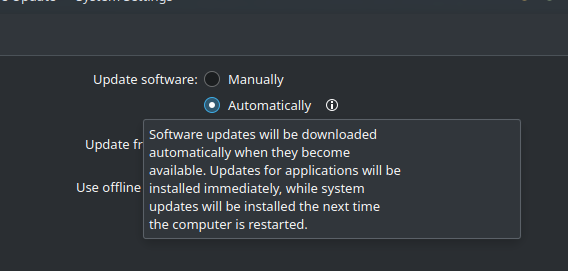Speaking from experience, from a long time ago, and from the people/family I’ve installed it for on older machines: It’s different. That’s 90% of it.
The people that had little to no windows/PC experience actually took to Linux a lot easier not having to relearn/change habits from windows.
Yes, I had my mom start with Linux and she’s confused when she has to use Windows.
Correct. It’s lack of familiarity. Once Linux gets around 10-15% market share, enough people who know the quirks of Linux to help new people who then Linux will be big.
Based on my tests on my family and friends, the main problem is tech support. Most geeks seem to assume other people want the same things than themselves (privacy, freedom, etc). Well, they don’t. They want a computer that just works.
Overall when using Linux, people actually don’t need much tech support, but they need it. My father put it really well by saying: “the best OS is the one of your neighbor.”
I apply few rules:
-
The deal with my family and friends is simple: you want tech support from me ? ok, then I’m going to pick your computer (usually old Lenovo Thinkpads bought on Ebay at ~300€) and I’m going to install Linux on it.
-
I’m not shy. I ask them if they want me to have remote access to their computer. If they accept, I install a Meshcentral agent. Thing is, on other OS, they are already spied on by Google, Microsoft, Apple, etc. And most people think “they have nothing to hide”. Therefore why should they worry more about a family member or a friend than some unknown big company ? Fun fact, I’ve been really surprised by how easily people do accept that I keep a remote access on their computer: even people that are not family ! Pretty much everybody has gladly agreed up to now. (and God knows I’ve been really clear that I can access their computer whenever I want).
-
I install the system for them and I make the major updates for them. Therefore, if I have remote access to the system, I pick the distribution I’m the most at ease with (Debian). They just don’t care what actually runs on their computers.
-
When they have a problem, they call me after 8pm. With remote access, most problems are solved in a matter of minutes. Usually, they call me a few times the first days, and then I never hear from them anymore until the next major update.
So far, everybody seems really happy with this deal. And for those wondering, I can see in Meshcentral they really do use those computers :-P
When i told my dad i can install Rustdesk on his computer to do remote support (moved out), he asked me “does that mean you can look at my computer whenever you want?”. I’m really proud of him, he actually listened.
I think people sell themselves short with regards to having undue access to family members’ computers. If they’re willing to give it then you’ve clearly demonstrated that you’re trustworthy and haven’t given them reason to assume you’ll snoop or worse steal from them.
Are there any limitations to Meshcentral? I tried using Team Viewer and a few others when I was supporting family on Windows, and they all wanted to charge me after a while.
I self-host Meshcentral. I haven’t seen any limitation at all. I don’t know if there are limitations when you use meshcentral.com instead of self-hosting.
Thanks for replying :)
I’ll have a look into it, thanks. I pretty much only support my mother’s laptop outside of my house now, but I use NoMachine to sort out the home computers. As much as I like it, it can be a bit slow sometimes, and it’s always in the back of my mind that it’s going to lock me out like the others did.
Oh actually if you are worried about vendor lock-in: Meshcentral is opensource. So even if they decide to try something stupid, a fork would be likely to happen.
Wayland, unless something’s changed since the last time I tried it.
Try Anydesk, it’s very much like Teamviewer in many ways, though it’s not FOSS.
-
New user: I have a problem 😊
Everyone:👍
- are you on xorg or wayland?
- pulseaudio or pipewire?
- what WM/DE are you using?
- amd or nvidia?
- what distro?
- systemd?
New user: Nevermind 😮💨
if a new user is using a distro that doesn’t use systemd they fell for a meme
if a new user is using a distro that doesn’t use systemd they fell for a meme
Or they hate fridge art like systemd and are on something like PCLinuxOS or Alpine.
That’s what I mean though, why would a new user be running alpine as a desktop os?
That would be me: My hardware at the time was crap so I couldn’t use the usual mint, ubuntu, etc and I was gonna use debian but I couldn’t find the x86 download button, so after a bunch of messing about with distros like puppy and #!++, I settled on alpine for a bit. I now have decent hardware and use fedora.
At this point, my biggest dream is that these ‘new user’ distros used only Wayland, Pipewire, Systemd and Flatpaks simply to simplify things. Hopefully we’re less than 2024 away from NoVideo Wayland support.
Also as soon as XFCE releases their Wayland support, that soon it’ll become the most famous DE choice of Mint.
What I am really happy is to see how well supported Pipewire already is. Pipewire has never showed any problem in the new installs for me.
The problem with that is most major distros market themselves as “new user” distros to some extent though. Noob-friendly, out-of-the-box, easy, etc are all distro-marketing buzz-words that mean nothing.
You can’t expect them to only use Wayland, Pipewire, Systemd, and Flatpaks because that dream requires every distro to use Wayland, Pipewire, Systemd, and Flatpaks, which will never be reality.
Most distros will probably eventually adopt these tools, but there won’t be a sudden shift. It will be gradual.
Well, for Pipewire it’s the apps which needs to adjust at this point. Only thing missing currently is the Wayland but it’s coming. Making Linux less fragmented (read: confusing), the more new users will give a try.
Systemd
Fridge art. Fuck, they MAYBE have nfsroot working. MAYBE. After a decade of fucking around, when it was available for ages. The number of bags on the side of lennart’s piece of crap, just to reinvent the wheels we had before, is absolutely ridiculous.
and Flatpaks
… break single source of truth for as-built information and current software manifest. This kills validation, which dissolves certainty on consistency, then repeatability. And given the state of the software load exported to management tools is NOT the flatpak source of truth, you now have a false negative on the ‘installation’ of a flatpak resource when checking it via management.
Oh. That needs to be on the interview questions.
Gonna be honest with you I’m an intermediate user and understood jack shit of what you just said. A beginner and average user would have probably been scared off by Linux by this point rewding this.
A beginner and average user would have probably been scared off by Linux by this point rewding this.
Maybe thats what he/she was trying to achieve.
So … basically Pop!_OS.
That’s what I’m using now, and it’s what I’d recommend for most desktop users. I’ve been using Linux systems on-and-off since before kernel version 1.0: Slackware, then Debian, then Ubuntu, then Mint, then Pop.
(Admittedly, my use cases are pretty simple: a terminal, a browser, Signal, VLC, and Steam.)
Pretty much. Pop is my go-to recommendation for pretty much anyone these days. It’s so well polished and just easy.
This PopOs ?
Yes, that pop os. As luck would have it, Linus installed it during a very brief period where the steam package in their repo was broken. This is not a common occurrence, and I have never heard of it happening before or since.
This whole series triggered me so hard. They went out of their way to test it under the worst possible conditions.
- last at night
- setting a goal with a deadline/time constraints for first run
- not stopping and reading or thinking, just assuming away
- copy paste from google frsit thing that looks vagualy right
- tunnel vission
- not resources like Emily, ensuring they make big mistakes
Then they follow up with hypocrisy of this shit, after going on and on about UI not being right or hard to use for the end user.
Here is an alternative Piped link(s): https://piped.video/watch?v=smd8cTFchF4
Piped is a privacy-respecting open-source alternative frontend to YouTube.
I’m open-source, check me out at GitHub.
pipewire seems ready for primetime but I’m more dubious about Wayland. For instance KDE appears to still be a bit flaky and sway still works poorly under Nvidia and will never have proper mixed DPI for xwayland apps. Still seems like a tradeoff vs X which doesn’t require a compromise. XFCE is roughly 10% of Mint users. Mint users are unlikely to switch because of wayland support
So you want them to provide answers by using magic? If you seek support for any software, open source or otherwise, you’ll need to tell them version, build number etc. Why do you think Linux will be any different?
Because people can already barely provide this level of information for a Windows device. Most of these words look like technobabble to non-tech-enthusiasts
Of course the words will be different. They aren’t hard words. And they can be answered very easily. In fact, most forums ask to include an output of something like
inxi -Fazywith every question, thus eliminating the need for all of these things.For more niche problems, people might ask for more specific information. But most of the time, they’ll tell you exactly what to run to get that information.
You know what’s the Windows alternative for this? Most of the time, nothing. You need to reinstall Windows. Mac is similar, except you need to have it replaced. You actually CAN repair Linux. That’s the difference.
Doing tech support, I encountered this attitude. People like that are nearly impossible to help. “Why can’t you just fix it!” The true answer never given is that your problem is probably something stupid you are doing, like trying to make a phone call by physically shoving the phone entirely up your asshole, and until I run through some common problems and ask some questions, I won’t be able to tell you to have your significant other get the salad tongs and pull it out of your rear and then go over “dialing.”
People mostly need to be willing to gather detailed system info with Inxi and share it.
I’ll have you know I get better reception when it’s up my ass!
No. That’s the support job to figure out the problem of the user. It is not the user’s job to figure out the support problems.
I work in support, so I know what I’m talking about. Unfortunately most computer guys are elitist assholes who can’t understand a user doesn’t have their knowledge or even the will to understand why this shitty tech is not working.
Free open source software projects you don’t pay for don’t have paid support. If you talk to a fellow user it IS your job to figure out your problem. if you don’t have the will to understand anything you ought to buy a support contract.
I don’t disagree with you, but to answer OP’s question, I think this right here is the problem. I love Linux for the same reason I love building my own PCs and working on my own car. For most people that don’t want to tinker, though, they’re looking for something that “just works” and can be fixed by someone else when it breaks.
It’s such a privileged attitude, though. One CAN get paid support, but they don’t need it if they’re just a bit patient and willing to follow instructions. If you don’t want to pay, don’t expect someone else to deal with your bullshit.
(I’m not saying this to you, but to anyone who has this attitude.)
It case the subject wasn’t entirely clear in my prior post I agree with you, and that is exactly what I was trying to say. You the user of a foss project, aren’t a customer unless you give someone money. It IS your job to figure out your own issues. If you ask for help from your fellow users and they graciously provide you help then this is a gift you should appreciate. Because the person isn’t an expert on that topic in the employ of the creator, they might not know everything, nor do they have the infinite patience imparted by being paid by the hour to provide you help. They have their own shit to do. Treating them with entitlement and contempt like people treat support will burn these sorts of folks out, and they are far from an infinite resource. If you want a paid support relationship instead of treating the open source community as free help whose time you are entitled to, you ought to actually pay someone to do that job.
Pay for support then. Companies like Canonical and Redhat will be happy to take your money.
Why don’t you magically have a magic button that magically fixes everything with no effort of my own? That’s stupid, I think I will go on social media and repeatedly tell everyone that Linux is bad actually
- Isn’t pre-installed on well known machines by well known brands.
- Popular applications (whether productivity, creativity, or games) do not work out of the box that people want. It doesn’t matter that alternatives exist, or that you can use things like Wine. If it’s more than just click the icon, it’s too much.
- If things cannot be done purely through touch / the mouse, it is too hard for most people.
While this is true, if someone goes to a shop and buys a “PC”, it will have Windows 100% of the time.
You have to look to get Linux preinstalled on stuff, or pick the choice yourself. People buying PCs aren’t picking Windows, it’s just what comes with them.
If things cannot be done purely through touch / the mouse, it is too hard for most people.
100%. Even as a power-user (understatement) who overwhelmingly prefers keyboard input to control things when I’m “gettin’ stuff done”, I will sometimes miss the general consideration level of Windows’ input handling when it comes to mouse and especially touch. Mouse is pretty damn good these days on Linux, but touch…
Touch is abysmal. A ton of modern laptops have touchscreens, or are actually 2-in-1s that fold into tablets, etc, and the support is just barely there, if at all. I’m not talking about driver support - this is often fairly acceptable. My laptop’s touch and pen interface worked right out of the box… technically. But KDE Plasma 5 with Wayland- an allegedly very modern desktop stack- is not pleasant when I fold into tablet mode.
The sole (seriously, I’ve looked) Wayland on-screen-keyboard, Maliit, is just terrible. No settings of any kind (there is a settings button! it is not wired to anything, it does nothing), no language options, no layout options (the default layout is abysmal and lacks any ‘functional’ keys like arrows, pgup/dn, home/end, delete, F keys, tab, etc), and most egregiously, it resists being manually summoned which is terrible because it does not summon itself at appropriate times. Firefox is invisible to it. KRunner is invisible to it. The application search bar is invisible to it. It will happily pop up when I tap into Konsole, but it’s totally useless as it is completely devoid of vital keys. Touch on Wayland is absolutely pointless.
Of course, there is a diverse ecosystem of virtual keyboards and such on Xorg! However, Xorg performance across all applications is typically abysmal (below 1FPS) if the screen is rotated at all. This is evidently a well known issue that I doubt will ever be fixed.
In the spirit of Open Source Software, and knowing that simply complaining loudly has little benefit for anyone, I have at several times channeled my frustration towards developing a reasonable Wayland virtual keyboard, but it’s a daunting project fraught with serious problems and I have little free-time, so it’s barely left its infancy in my dev folder, and in the meanwhile I reluctantly just flip my keyboard back around on the couch with a sigh, briefly envious of my friend’s extremely-touch-capable Windows 2-in-1.
I echo your frustrations with Maalit. I am running Arch on my Surface Pro 7 and very frequently I have to snap in the keyboard just to get myself out of a situation where touch doesn’t work. Maalit also has this bug where it will push and resize windows as if it was visible even though it is hidden.
Regarding the Firefox issue, it helps if you enable it’s Wayland backend by passing MOZ_ENABLE_WAYLAND=1 to it. Maalit should properly pop whenever you tap on a text box.
MOZ_ENABLE_WAYLAND=1
Thank you - I was already aware of this, actually, but I choose to leave it disabled because when this is set, touchscreen drag-scrolling of webpages breaks and it selects text as though it were a mouse click-drag instead. As it turns out, I barely use Maliit anyway because of its other deficiencies, but I definitely touch-scroll my browser a lot, even in laptop mode. A generally disappointing dilemma!
I also had this problem where touch scrolling on Firefox selects text instead (on ubuntu). It does however work OOTB for me on fedora, so it’s the main distro on that machine.
I agree with the touchscreen thing-- I have one of those foldy-aroundy 2-in-1 laptops, and the only way I’ve been able to get touch to work properly (as in not like a mouse) is gnome wayland. Kde wayland’s fine too, but like you said there’s no included keyboard whereas gnome has one built-in. Also another wayland osk you could try is wvkbd (tho I’ve never used it beyond “hey what’s this”).
GNOME has amazing touchscreen gestures, and afaik comes with it’s own virtual keyboard
I have been tempted by GNOME several times, but I disagree with some of their design choices and find them a bit frustrating. I feel that it’s fairly strongly-opinionated software. The benefits, of course, are obvious: internal consistency that leads to a higher quality experience. But, only if you buy-in to some overarching design philosophy. That’s one of the reasons I left Windows! I also have a suite of Kwin scripts that make my life a lot easier, so it’s pretty hard to leave Plasma at this point.
Still, that keyboard has tempted me a lot nonetheless…
Me too. I love the look of Adwaita, but some of their choices I can’t get past, like not having a system tray. I’m really excited for Cosmic, it looks like it will blend the styling of GNOME with much of KDE’s customization!
#1 is just not being the default for 99% of devices. If someone gets a new computer, why would they go through the effort of installing a new os when the one it comes with works fine? Hell, I bet at least 50% of people in the market for a pc don’t even know what an OS is.
Agreed. Android and chrome os are used happily by 10s of millions without any idea it’s a Linux distro
I bet if small, cheap netbooks came out running mint or fedora or something people wouldn’t even or know or care that it was Linux.
Indeed, many Netbooks come with a firmware dual boot. Besides the crappy Windows lite edition, there’s a tiny instant-on Linux too. Most people don’t use that, but it’s there.
In middle school I had a USB drive with Linux Mint installed on it which I was using on school PCs. We only used those PCs for internet browsing and office. Not a single soul noticed it wasn’t Windows. Teacher only noticed 2 differences, “You have different version of Office installed here.” and also gave me a note for “Changing wallpaper” which was strictly prohibited for some reason.
which was strictly prohibited
It was probably due to some goober like me changing it to Scarlett Johansson’s bikini pics. I’m sorry.
deleted by creator
Absolutely. In fact i think everyone is hoping steam os will be the distro to make the big push onto desktop because of the gaming and another just works kind of interface
Indeed, many Netbooks come with a firmware dual boot. Besides the crappy Windows lite edition, there’s a tiny instant-on Linux too. Most people don’t use that, but it’s there.
Which actually means Linux is being successfully adopted by the general public in a similar way to windows as a general use system that doesn’t require a lot of technical knowledge.
Fully customizable distress will never be popular with the general public. They want systems that just do the general stuff and have it work automatically.
I bet at least 50% of people in the market for a pc don’t even know what an OS is.
70%*
Of course they know what an OS is. There’s only two of them: Apple and Microsoft.
my first thought actually pointed to common OS on work devices, being Windows i’d assume a majority of the time, i’d imagine a large portion of the older population were introduced to computers in a workplace setting. But your answer makes a bit more sense.
You have to use the terminal
Anything using the terminal… I once tried to do something on Linux because a friend told me it was great. I gave it another go when it came up on my Chromebook and tried to teach myself. I just don’t get it.
I’m not a programmer at all, so anything that involves typing commands is going to baffle me!
One thing i had to learn when i started to understand how big techs really work, of what that would imply (see chat control) and get passionate about free software, free operative systems and freedom of customization is that freedom itself almost always requires work, the question is: is that a work you’re willing to do? for me the answer is a strong YES.
For the average user all that extra works gives them very little return.
Most people don’t want everyday computer use to be work.
Fair.
But I was just giving my perspective as an outsider who stumbled across this post because messing about with the terminal had the opposite affect on me as someone who appreciates the concept of Linux but doesn’t really have the level of passion to learn programming for it.
I’m not a programmer at all, so anything that involves typing commands is going to baffle me!
When I was in college in the 1990s, non-STEM students regularly learned enough of the Unix command-line to:
- check their email with
pine - chat with
talkor on IRC - write their home page in HTML using
picoorjoeeditors
The command line is something that millions of people have learned; and you can, too!
- check their email with
YES! I fucking hate it. I shouldn’t have to enter code in order to install a program. I want to go to a website and download the software, click install, and have it actually just work.
I’ve used mint for several years now but it will never be a primary OS die my household because it’s such a hassle to work with.
On many popular distros there are graphical apps preinstalled for that. The distribution maintainers have repositories with common packages to make it so that you can open an app store and install programs from one place rather than going to different websites and downloading installers.
deleted by creator
The main issue is that easy problems that should be solved baseline by the OS crop up far too often for the average user to want to have to deal with day to day. Also, whenever you go to ask on a forum, you’re usually told to just do something entirely different or use another distro. Every time I go to fix something on this machine it sends me down a rabbit hole of shit I don’t care about because it doesn’t solve my problem since it introduces a brand new one to solve. If I want to use solution X don’t tell me to go install program Y that’s your favorite program to use but is literally not what I’m trying to accomplish.
Today I installed Manjaro onto an old laptop and for the life of me I could not figure out why it wasn’t connecting to the internet. It wasn’t a network issue, it was the fact that the time was out of sync. It took me a while to realize that was the issue and not that I had fucked up my router config or something. It just couldn’t validate any cryptography because the time was off. There were like four different solutions that all attempted the same fix and eventually I was able to connect with ethernet and restart timesync, which only worked after a restart.
- Installation process of Linux is complicated to an average Joe (Bootable USB/ISO file/Boot priority/format <- what are these scary terms?)
- Lack of availability of pre-installed Linux PCs at physical shops
- Lack of availability of industry-standard software
- Confusion for an average Joe due to excess choice of distros/application packaging format. Average people don’t want choices, they want to be guided.
- (Minor point) Most available guides for doing something heavily requires terminal usage which can be daunting to new users
To be honest, one part is what everyone mentioned here. Not being preinstalled and all that.
The other part is that unfortunately at least according to my own expirence as a Linux noob a few years ago some Linux communities can be very toxic. If you’re asking questions of how to do X and someone comes along and is all “why do you even want to do X if you could also do Y? Which is something entirely different but also does something vaguely similar”
That’s one if the things.
And then other curiosities. I cannot for example for the life of me get my main monitor to work under Linux with any new Kernel version. My Laptop just refuses to output to it or the second monitor attached via Display port daisychaining. On the older version it works, on the newer it’s broken. I have tried troubleshooting this problem for over half a year and it’s still broken. And that’s out of the Box on Ubuntu LTS…
So i don’t really understand this question. There are major roadblocks. With Wayland which is default for Ubuntu now those roadblock jist became bigger. Screensharing in multiple Apps including slack is outright broken unless you use the shitty webapp. The main player Office 365 largely doesn’t work at all on Linux. All these things that should work for a Desktop operating System don’t work out of the Box as they should.
That’s why people aren’t using it and companies aren’t preinstalling it.
The actual answer, there is no reason to switch. The vast majority of users do not care about Linux or why they would want to. For us there are lots of benefits and things we enjoy about getting away from Windows but for them “why?”
I will object on this one. Even if the majority of user does not care about privacy they do care about ransomware , viruses, speed of the system and in my opinion Linux / BSD is secure, fast and speed remains after time not like Windows where I felt that after 6 months I had to reinstall to get a performant system. I guess it is all about convincing your family and friends about those benefits.
Two weeks ago my step mother asked me “Can you help my friend connect her PC to the wifi, it runs Windows XP” users are fucking weird.
- Self updating without user interaction per default.
- Better support of codecs and drivers.
deleted by creator
See, that paragraph alone is too much for the majority of non-Linux users.
i believe fedora has this by default

Self updating without user interaction per default.
I think that this is a terrible idea, until a clear boundary is set between applications that can or cannot break the system. Updating flatpaks automatically might be fine, but updating everything is simply a recipe for disaster.
Linux does have better codecs and drivers than Windows for some stuff (Bluetooth for example), but it has worse codecs and drivers for some important proprietary hardware stuff (Nvidia for example)
- All of the basics should just work well out of the box with minimal tweaking. Yes even NVIDIA stuff.
- The software center needs a massive overhaul. It feels like an afterthought by people who would rather use a command line.
Yeah, the descriptions and lack of curation is really weird … browse games and oh look here’s 27 varieties of reversi and a driving game that crashes on launch.
If it were a curated list with enthusiastic and helpful descriptions it would make it more accessible to use. Get the mature and professional looking programs front and center.
Much as I hate to say it, it could do with a makeover from someone with a sense of marketing. (Excuse me for a second, I felt a little nauseous saying that).
Im not sure the software center being half baked is even the real problem.
One of the nice things about Windows is that you dont need a central, curated, repository for software. You can google the thing you want and just download an msi/exe of the latest stable version and, 99.9% of the time, leading back to your first point, it will just work.
What? That is easiest one of the worst parts of windows. It’s just that people are used to this dumb endeavour
Why do you think its bad? From a secruity standpoint its obviously not great, but its undeniably more convenient than running a curl command to pull in a third party .repo file, yum update and yum install to get something that isnt easily available in my base repos.
Nothing more convenient then a central “app store”. apt search, apt install is all I need. But I undersntd that people don’t like it, that don’t know it.
What’s convenient about googling for software, downloading ominous files and clicking through an install wizard and most likely installing some adware and unwanted search bars? It’s crazy people see it like that.
Even the other posters in this thread are talking about flatpak and appimage. I’ll never understand that way of thought.
That’s a pretty bad point you made there. Imagine having to google for each app on your smartphone and tell me how that’s better.
What about the scammy search results that point to malware infected sites?
What about stability and security updates for the software you obtained that way? Every software will have it’s own update mechanism, if there’s one at all.
How is it not better to install or update all software on the computer with a single click or command?
@Narwhalrus you can also use winget (built into Win 11) or chocolatey to install most any software package now, similar to apt.
Yep. I use both quite a bit. Chocolatey is great!
The point Im trying to make is package managers are better suited for developers and the lack of a great alternative for installing software on the distros I’ve used is not helping with the mass appeal of Linux.
I could be wrong here as I’ve never tried any of the “home computer” distros (mint, ubuntu).
Doesn’t seem to have stopped people on Android and iPhone from figuring it out!
Preinstalled.
Like, were nerds and we fuck with our computers n stuff. But most people are lucky to know what a power cord is.
Honestly if Linux with a good DE like KDE or Cinnamon was already on their PC at boot they would figure it out. Most people just use a web browser anyways.
I have put my dad on Kubuntu. Don’t like anything *buntu, personally, but I have to admit it’s quite stable and with sane defaults. He hasn’t complained ever since and support calls dropped considerably. He spends most of the time in Firefox anyways, where I’ve added ublock.
The problem with Windows was, he’d occasionally browse the web with Edge by mistake (or because MS forces it down your throat), and as soon as an 80+ y.o. browses the web without ad blocking, getting a virus is just a matter of time.
All this is to say that I agree with the fact that preinstalled is key. I wish that more effort was focused on fewer distros and I feel that so much talent and energies are being lost in marginal projects.
But many people do this for passion and it’s of course their choice to decide where to contribute, or whether to spin up a brand new distro entirely, can’t judge them for that. I’m just observing that those energies could be better used to smoothen some rough edges on more popular distros to make them even more appealing to OEMs and convince them to ship those on their hardware.
Give them arch































